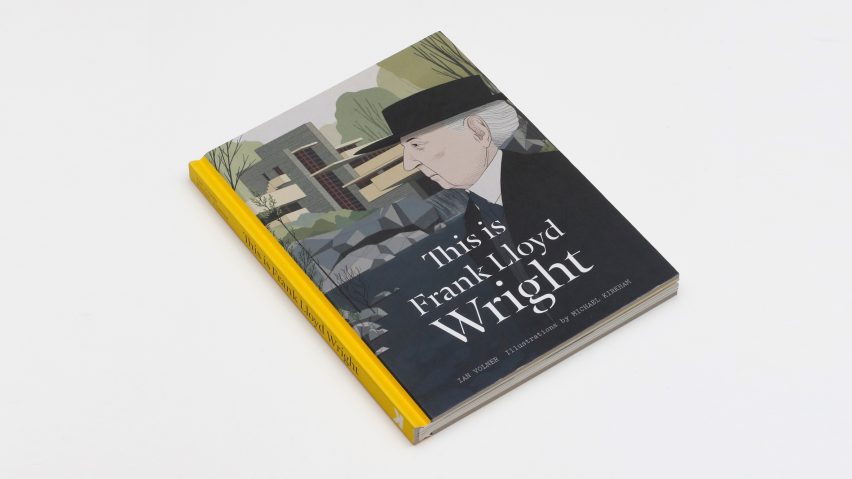A Frank Lloyd Wright monograph disguised as a children's book and a photo reportage of African modernism shot by Iwan Baan have been chosen as the top 10 books about architecture from 2016.
Books in the list drawn up by the organisers of the Frankfurt Book Fair and the Deutsches Architekturmuseum (DAM) in Frankfurt are to be awarded the DAM Architectural Book Award – the world's only architecture-specific book prize.
Now in its eighth year, the award attracted 214 submissions from 88 publishers worldwide. The ten winners were selected based on their innovation and topicality, as well as overall design and finishing.
A prize-giving ceremony will be held on 19 October 2016 in the library at Deutsches Architekturmuseum to coincide with the Frankfurt Book Fair, which takes place in the German city until the 23rd of this month.
Here's the top ten, in no particular order:
African Modernism – Architecture of Independence by Manuel Herz, Ingrid Schröder, Hans Focketyn and Julia Jamrozik
The book highlights 80 examples of modernist structures built in Ghana, Senegal, Côte d'Ivoire, Kenya and Zambia in the 1960s and 1970s. Written by Basel architect Manuel Herz and with photography by Iwan Baan, it shows the architecture produced in the countries' first years of independence from Britain and France.
"An astonishing tour de force taking in five totally different sub-Saharan countries by Manuel Herz and his students at the Swiss Federal Institute of Technology (ETH) in Zurich," said the competition jury.
Dieter Kienast - Stadt und Landschaft lesbar machen by Anette Freytag
This monograph by art historian and ETH Zurich researcher Anette Freytag picks apart the design thinking behind the work of Swiss landscape architect Dieter Kienast.
"Anette Freytag vividly breaks down how design, theory, and presentation are interwoven in Dieter Kienast’s work, and how the latter is a combination of artistic, scientific, intellectual, and social aspects," said the jury.
Habitat Marocain Documents - Dynamics Between Formal and Informal Housing by Jean Hentsch, Udo Kultermann, Sascha Roesler, André Studer and Theres Studer
Described by the jury as as "evolutionary building monograph", this book provides a study on a trio of small settlements built by Swiss architects Jean Hentsch and André Studer towards the end of the French colonial era in Casablanca.
Housing Cairo: The Informal Response by Marc Angélil and Charlotte Malterre-Barthes
Housing Cairo charts the informal urbanisation in Cairo, using photographs and plans to traces the city's development to present day, with a particular focus on the west bank of the Nile.
"With its clear, well thought-through concept, Housing Cairo is a lovely, compact compendium about an important topic," said the jury in its citation.
Das leichte Haus. Utopie und Realität der Membranarchitektur by Walter Scheiffele
Based on the 1926 book Space as Membrane by Siegfried Ebeling, this publication looks into the history of lightweight construction – from Bruno Taut's glass architecture to Frei Otto's tensile structures.
"The direct visual access to the archive documents is a particularly attractive feature: photographs of newspaper articles, texts, drawings, watercolours and much more," said the jury. "An extensive annex with footnotes, literature references, as well as a subject and people index complete the work."
Manual of Section by Paul Lewis, Marc Tsurumaki and David J Lewis
Cross-sections offer a peek inside the walls and floors of 62 buildings from the twentieth century, including Le Corbusier's chapel in Ronchamp.
"The idea is so surprisingly obvious that one really wonders why no one ever thought of it until now," said the jury. "Insights resulting from the method behind the cross-section make the book a textbook, which all architecture students ought to consult from their very first semester on."
Nadogradnje – Urban Self-Regulation in Post-Yugoslav Cities, edited by Sven Quadflieg and Gregor Theune with contributions by Martin Düchs, Monika Grubbauer, Hanna Hilbrandt, Vladimir Kulić and Dubravka Sekulić."
Photographs by Gregor Theune document DIY extensions to the socialist-era homes found in the countries that once made up Yugoslavia. This inexpert building style is discussed in six essays by architects and urban researchers.
The editors describe this form of informal architecture as a sort of urban self-regulation, which would appear to be spreading rapidly," said the jury. "Tenants take their right to residence in their own hands and realise it accordingly."
The Other Architect by Giovanna Borasi
The Other Architect is an exhibition catalogue for The Other Architect show at the Canadian Centre for Architecture. It considers 20 examples of architectural thinking from the 1960s to present day.
"It is not about building or buildings, but about thinking," said the jury. "The main section is a genuine treasure trove of original documents"
This is Frank Lloyd Wright by Ian Volner
This monograph of American architect Frank Lloyd Wright is penned by architectural journalist Ian Volner. Broken down into digestible chunks and illustrated by Michael Kirkman, it traces the architect's life from childhood through to the design of some of his most famous buildings, including Fallingwater and the New York Guggenheim Museum.
"Short articles, sumptuous illustrations, and a cover made of hard cardboard give This is Frank Lloyd Wright the appearance of a children’s book," said the jury. "It is a clever disguise for a successful introduction to the work of one of the greatest architects of recent times – educational literature at its best."
Völlig losgelöst by Christian Flierl, Ulrike Jehle-Schulte Strathaus and Roger Ehret
The title of this book refers to a pop song from the 1980s, but its pages focus on the architecture specific to northwest Switzerland. Photography by Christian Flierl shows little-known buildings accompanied by short interviews with architecture historians.
"Full of images of cities and regions, books like this usually start gathering dust on shelves relatively quickly. This one, however, deserves considerably more attention," said the jury. "It features anything but the expected colourful postcard images of buildings normally classified as worth seeing."

